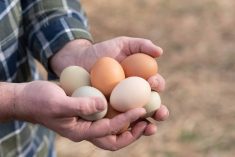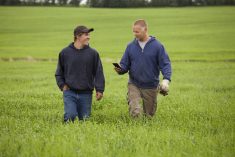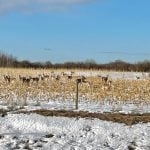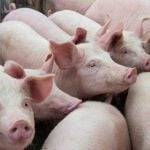As you may have heard, this year marks the 150th anniversary of Confederation. It’s worth taking stock of where we’ve been and where we are now, and so I’m going to use this space to do just that, on issues important to agriculture and rural communities.
I’m tapping out this column a few days before President-Elect Donald Trump’s inauguration. To be honest, it’s hard not to tail spin into hyperbolic anxiety when I think of Trump. But it’s worth stepping back and trying to see the bigger picture instead of focusing on Trump’s personality and the latest allegations (troubling as they are).
Read Also

Gentle treatments for pain in the neck
Heading toward year-end, people unknowingly tense up against the cold and busyness, causing neck pain that can often be treated with appropriate support and gentle mobility, athletic therapist Kathlyn Hossack says.
It’s worth noting that although Canada’s relationship with the U.S. hasn’t always been smooth sailing, we haven’t had a major military conflict since before Confederation. That is something most of us take for granted, but it is a remarkable feat.
The reality is that we are quite interdependent, especially when you consider our trade. David Frum, a senior editor of The Atlantic and former speech writer for George W. Bush, delivered a keynote at CropSphere in January. In a media scrum afterwards, he pointed out the U.S.-Canada relationship doesn’t run entirely through the national capitals. Provincial delegations have told Frum that they’re on the phone to their U.S. counterparts in state capitals all the time.
“These are integrated relationships that look a lot like the domestic economy, frankly,” said Frum. That means if Ottawa tries to slap the U.S., western Canadians are likely to howl that it hurts them more than the Americans (or vice versa).
Despite protectionist rumblings, producers groups aren’t lighting their hair on fire yet, as Ryder Lee, CEO of the Saskatchewan Cattlemen’s Association, said back in November. I caught up with Lee during Canadian Western Agribition, and he was quite reassuring, even though there was talk of breathing life back into mandatory country-of-origin labeling (COOL).
Lee expected to hear plenty of proposals from the new administration right up to Trump’s inauguration and beyond. He compared those proposals to spit balls. “They’re waiting to see what sticks and what doesn’t.”
That doesn’t mean the beef industry is ignoring them, Lee added. The Canadian Cattlemen’s Association has staff on the ground, talking to elected officials and staff, and reminding them of the trade history between the two countries, Lee said. Canada is well-equipped for another trade disruption, he said, with people who learned a lot going through BSE.
Lee said COOL is recent enough that everyone should know about the WTO rulings and what’s on Canada’s retaliation list. But those kinds of trade actions are always a risk, he added. “It’s a garden that needs tending all the time.”
You may be wondering (as I was) whether Trump really understood the complexities of trade between our two nations. I asked Frum about that, and he reminded me that the U.S. president isn’t the whole of the government. There’s Congress, and there are people working for government agencies who are “very sophisticated” about trade and economic issues, he said. In the U.S., there’s “a constant flow” of people going back and forth between the private and government sectors, he told us during the media scrum.
Frum also pointed out that although Trump has a lot of energy, it is finite. If his negative energy is redirected from issues that hurt Canada, he’ll run out of steam before he gets to us.
Of course, we also trade with other countries, so if Trump does in fact “blow up world trading systems,” as Frum put it, it will affect us too. Frum compared it to slicing one or two of your arteries and thinking the rest of your arteries will be fine.
And then there’s Russia
It was just over three years ago that then federal agriculture minister Gerry Ritz told Country Guide reporter Maggie Van Camp about his relationship with Russia’s ag minister. Ritz said he gave his counterpart a pair of cowboy boots made from the ostriches he once raised, “forging a friendship,” Van Camp wrote (see “Blood, sweat and deals,”at country-guide.ca).
That’s not a criticism of Ritz. He gifted those cowboy boots before Russia moved into the Crimea. It is a sign of how much things have changed between Canada and Russia in the last few years.
Chrystia Freeland, who recently took the helm of Foreign Affairs, has some impressive qualifications. She speaks Russian and Ukrainian (among other languages), she’s written books on the global business elite and Russia’s transition to capitalism, she’s lived in Russia, and she’s a Rhodes Scholar. Not bad for a farm girl from Peace River, Alberta.
She’s also been banned from Russia by Putin for criticizing his annexation of Crimea. It remains to be seen how Freeland’s past criticisms of Russia play out in D.C. Personally, I don’t want to see any of Canada’s cabinet ministers cozying up to Putin these days, although Trump would disagree.
“Having a good relationship with Russia is a good thing, not a bad thing. Only ‘stupid’ people, or fools, would think that is bad!” That is a tweet from the President-elect himself, back on January 7th.
But on the other hand, by January 11th, Trump was tweeting: “Russia has never tried to use leverage over me. I HAVE NOTHING TO DO WITH RUSSIA — NO DEALS, NO LOANS, NO NOTHING!”
I guess the one certainty in all this is that it won’t be boring. As Frum said, we are about to see a test of the whole American system. Our federal government will be tested as well.
And we’re going to see a test of ag groups as they try to maintain relationships with the U.S., China, and many other trading partners.
Luckily, it’s not their first rodeo. But I’m betting they haven’t seen a rodeo quite like this. So hold on to your hats. It’s going to be a heck of a ride.















